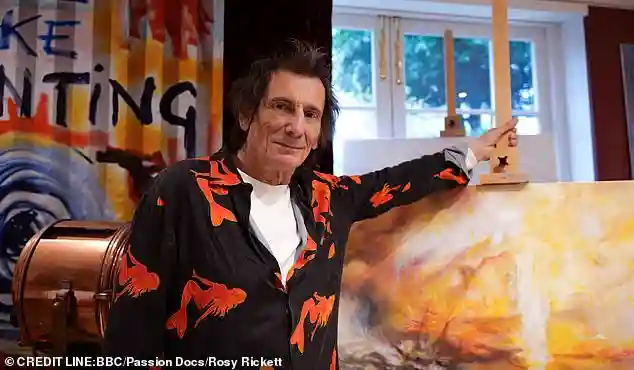The BBC slipped in an unlikely guest expert during Turner: The Secret Sketchbooks last night—someone who knows his way around a guitar far more than a paintbrush.
Yet there was Ronnie Wood, yes, that Ronnie Wood from The Rolling Stones, speaking with such enthusiasm about Turner’s Falls Of The Rhine At Schaffhausen that you’d think he’d spent his whole life perched beside an easel.
Wood didn’t just nod along politely; he broke down the energy of the brushstrokes, the heaviness of the pigments, and the sense of drama pulsing through the canvas.
It turns out he’s an artist himself, and he freely admitted that Turner’s stormy, emotional style has shaped the way he approaches music.
“Turner is pure drama,” he said—and coming from a rock legend, it carried a certain poetry.
Unlocking Thousands of Sketches—Some Not Exactly Primetime
Part of the documentary focused on Turner’s astonishing archive: a mountain of roughly 37,000 sketches he left behind.
Many of those drawings were tucked away for so long—and in some cases, deemed a little too risqué for early-evening viewing—that this was the first time they’d ever been shown on British television.
Turner’s later years, especially his fiery romance with a Margate landlady, have already inspired a celebrated film with Tim Spall.
But what this programme gently hinted at is that his childhood and rough-and-ready beginnings could easily warrant another.
A Covent Garden Childhood Nobody Expected
Before he became a giant of British art, Turner was just a boy from Covent Garden—a district that wasn’t remotely fashionable in his day.
His father worked as a barber, proudly hanging his son’s sketches in the shop window.
By sheer luck, those drawings caught the eye of Royal Academy regulars who nudged the boy toward formal training.
He entered the Academy’s drawing school as its youngest-ever student.
That alone raised eyebrows, but what truly made him stand out was his class background.
In those polished, aristocratic halls, Turner’s accent and upbringing stuck out like a muddy boot.
Imagine Danny Dyer suddenly hosting University Challenge—that’s the level of cultural whiplash.
The “He’s Basically Me” Club
The documentary couldn’t resist rounding up a crowd of talking heads who each claimed Turner as their spiritual twin. Tim Spall saw the Londoner connection.
Chris Packham, ever intense, latched onto Turner’s obsessive streak.
Tracey Emin chimed in too, remembering how her own art school days were peppered with comments about her voice being “shrill.”
Time clearly softens people. Emin now speaks so quietly it feels like she’s teaching calm breathing techniques rather than discussing rebellious art.
A Psychoanalytic Take on Turner’s Struggles
One of the more unexpected contributions came from a psychoanalyst.
She dug into Turner’s early architectural drawings, suggesting he used the solidity of buildings as an emotional anchor after a turbulent upbringing.
His mother suffered severe mental health crises at a time when such things were shrouded in stigma and fear.
Worried that her condition might shadow his own prospects, Turner arranged for her to be placed in a psychiatric institution.
He never visited her again—a fact the programme handled with a delicate, unsettling sadness.
Even Genius Has Its Detractors
Of course, no artist is universally adored. The documentary revived the voices of those who weren’t impressed: one critic complained Turner blurred land and sky beyond recognition; another dismissed his later works with the scathing remark that they resembled “omelettes.”
It was a reminder that even the masters get roasted from time to time.
So… Where’s Ronnie’s Art Series?
After watching Ronnie Wood discuss Turner with such warmth, precision, and downright delight, it’s hard not to wonder why he doesn’t have his own BBC art series already.
If the channel wants a show that is both chaotic and charming in equal measure, Ronnie Wood On Art practically writes itself.
Honestly, I’d tune in without hesitation.
Share on Facebook «||» Share on Twitter «||» Share on Reddit «||» Share on LinkedIn
